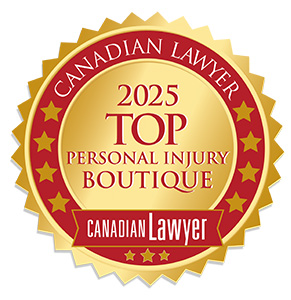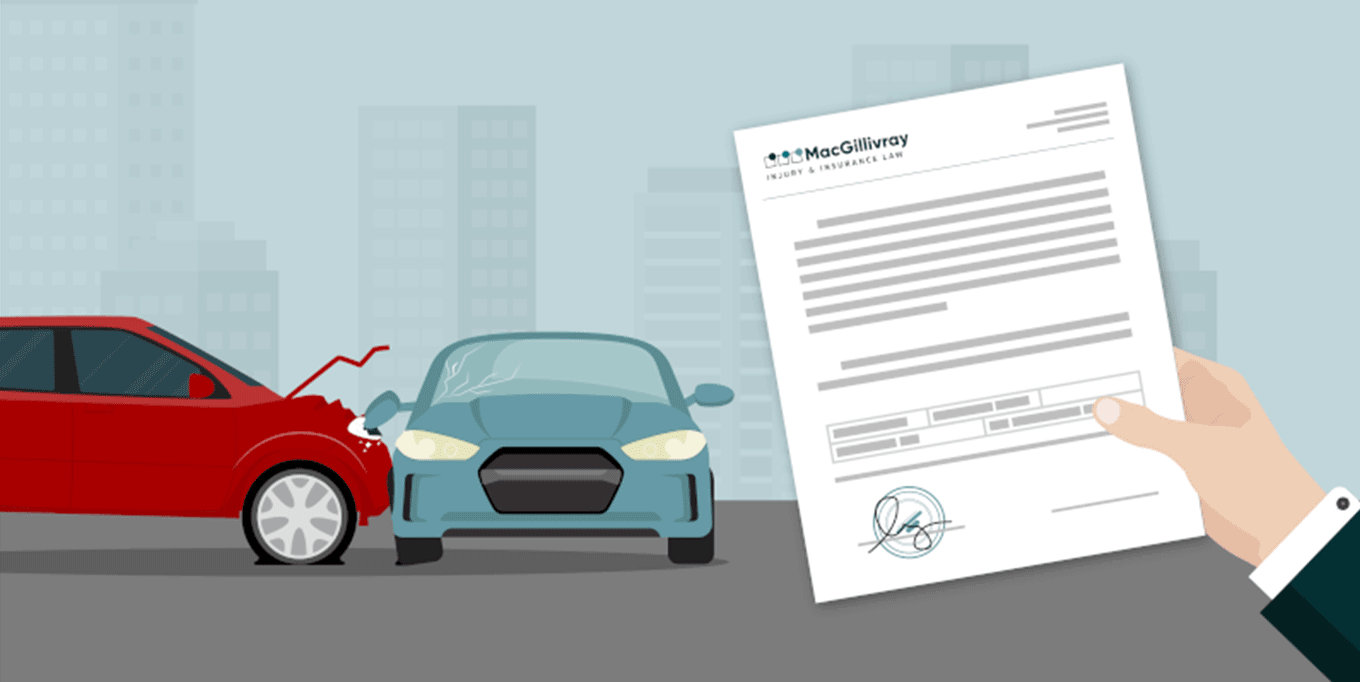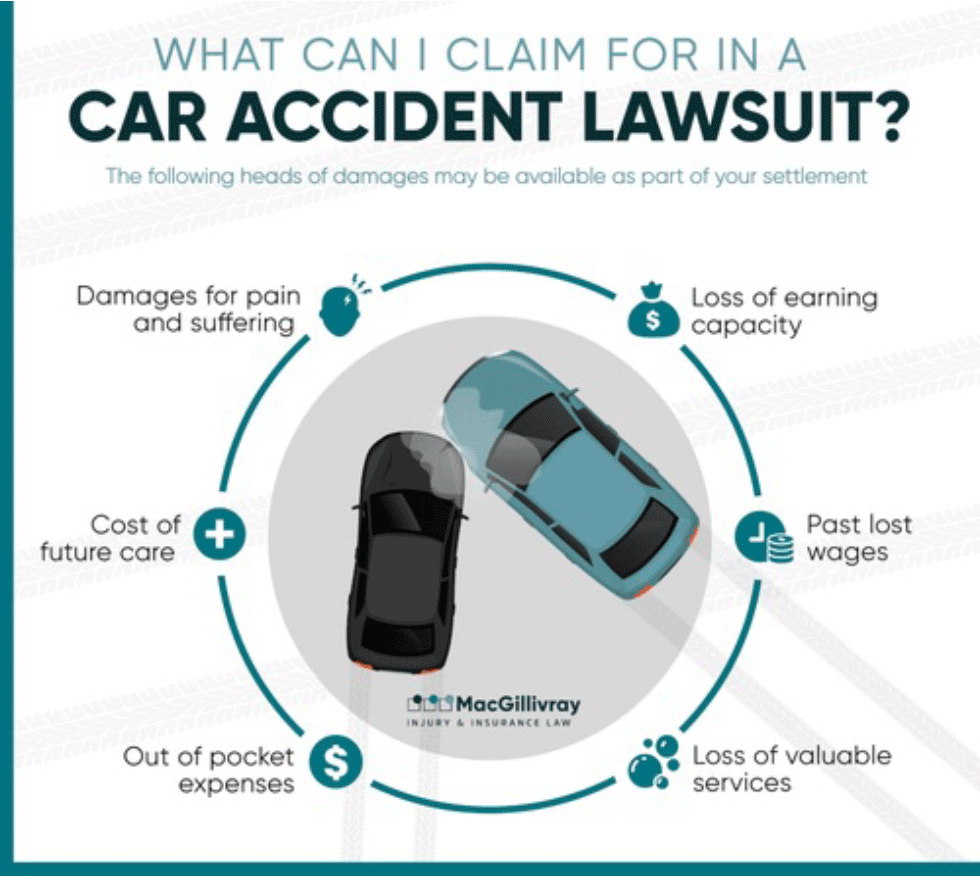




Suing after a car accident
For 30 years, we’ve been helping people involved in motor vehicle accidents receive fair compensation for their injuries.
After a car accident, you may be wondering, is it worth pursuing legal action? And how can a lawyer help me with my personal injury claim?
Insurance companies make money by paying out as little as possible in claims. The first offer made is not always the best, and the claim is often undervalued. While the legal process can take time, building a strong case and the threat of courtroom litigation can compel an insurance company to offer a fair settlement. In fact, most cases settle outside of court. Furthermore, an experienced personal injury lawyer will argue in your favor for eligible damages the insurance company may otherwise never acknowledge.
Our legal team will help you understand how motor vehicle insurance works, what the steps in the legal process are, and what kinds of benefits are available to you. And, if you’re not receiving the benefits you’re entitled to, then we will step in and fight for you.
We recommend speaking with an experienced personal injury lawyer who can provide you with information specific to your situation. Contact us today for a free consultation.
How long do I have to file a car accident lawsuit?
Time is of the essence when you’ve been involved in a motor vehicle accident. Engaging a lawyer promptly after an accident helps ensure that evidence from the scene of the accident, witness statements, and other time-sensitive support for your case is preserved.
There is also a legal limitation period in each province for filing a lawsuit. If you wait too long, you may lose your right to sue the at-fault driver. We recommend that you engage a lawyer as soon as possible to secure your right to compensation.
The legislation that establishes time limits for civil suits are limitation acts passed by the provincial legislatures. In Nova Scotia it’s the Limitation of Actions Act, New Brunswick’s is also called the Limitations of Actions Act, in Prince Edward Island it’s the Statute of Limitations, and in Newfoundland and Labrador it’s the Limitations Act. There are many common threads between each Province but there are also important differences to be aware of. There are some nuances to consider regarding filing your claim, each case can be different so get legal advice on this issue early.
What if a person under 19 is injured in a car accident? In Nova Scotia, New Brunswick, Newfoundland and Labrador the two year time limit does not start until a person turns 19. In Prince Edward Island, the time limit starts when a young person turns 18. In all four provinces it is safest to assume that the time limit for filing a car accident claim is 2 years.
How long does a lawsuit for car accident injuries take?
From the time you file the claim with the court, it takes two or three years to get a trial date. There are some procedures before trial, such as a discovery hearing. Sometimes, there may be a waiting period to determine the extent of a claimant’s recovery. An uncomplicated claim can resolve in a little more than a year if the insurance company is reasonable. To get the best compensation, a serious or catastrophic claim is likely to take three to five years.
Should I hire a lawyer for a car accident injury?
There are advantages to retaining a lawyer soon after suffering injuries in a car accident. It can speed up your case, the lawyer can get the right experts involved, protect your rights when giving statements, help get coverage for medical treatment, provide peace of mind during the process, and give you the leverage to get fair compensation.
- Speed
The process is long, but it could be even more lengthy if you postpone the decision to retain a lawyer. It is likely that the sooner you start your claim the sooner it will be over. It is good to not be in a rush but there is a healthy pace to keep, so that the months do not turn into years and years. The insurance companies tend to benefit from delay especially when people get discouraged or destitute and take a low offer. - Expert Evidence
In cases of more serious injuries, this can include getting opinions from experts including medical specialists, engineers, and economic experts. In more straightforward injury cases, there is still a lot evidence to gather from the treatment providers and the treating physicians including their opinions. The insurance adjustors and defense lawyers on the other side of the case will not pay fairly unless the evidence is in the file. Good lawyers will fund the cost of these reports for you. - Statements
Things you say or the way you answer questions could be taken out of context and later used against you. This could be during a formal statement or even a casual conversation during a phone call with the adjuster. The insurance company for the driver at fault has interests that are in opposition to yours. The legal process is called an adversarial system. This means that the adjuster or defence lawyer will likely try to minimize the value of your claim, they may try to be fair but ultimately they are your adversary. In some ways, it is their job to work against you. - Medical Treatment
Medical treatment is important to your case and your recovery. You have a duty to mitigate your damages or try to get better, so you should follow the recommendations of your medical team for medical treatment and aids. Sometimes, it is difficult to get funding for treatment from your own insurance company. A good lawyer has the tools to motivate your own insurance company to make sure they’re properly funding your medical treatment. Sometimes, it is even necessary to sue your own insurance company as well as the company for the driver who is at fault. Treatment is critical medically but also legally. Interruptions in your treatment will have a detrimental impact on both your recovery and your compensation. - Peace of Mind
With car accident insurance coverage there are twists, turns, and nuances. It is your lawyer’s job to understand your particular circumstances and apply the law and benefits available to those. The lawyer should track the timelines and make sure that nothing is missed. A good legal team is there to give you assurance and help you feel less stress, so you know your bases are covered and you are not doing anything wrong. - Leverage
Insurance companies have teams of insurance adjusters and lawyers. It is difficult to leverage them to ensure they’re providing fair compensation. If you are negotiating with them, you may feel that you have leverage by threatening to hire a lawyer. Even if you could value your case accurately, the threat of hiring a lawyer is not enough. To have leverage, the case has to be properly documented with the right evidence so the insurance adjuster can justify the settlement to the insurance executives who oversee them. To use an analogy, if two countries were in a dispute and there is a threat of violence, it is better to have troops on the border, than simply threaten to raise an army and then send them to the border. The threat of hiring a lawyer is a soft threat that does not worry the insurance company. Having a lawyer who can build the evidence and leverage the process to help obtain a fair settlement can make a significant difference.
How much is my car accident injury worth?
A claim’s value is based on many factors. These factors fall into legal categories called “heads of damages” that set out the types of damages that may be recoverable in a lawsuit.

Our General Damages Guide provides a full explanation of each category as well as general damage award data for various types of injuries. You can also use our Injury Claim Calculator to learn more about how to evaluate your claim.
The severity of your injuries is a major factor in valuing your claim. Our clients’ injuries range in severity, from whiplash and soft-tissue injuries, to broken and fractured bones, to more severe injuries such as traumatic brain injuries, paraplegia and quadriplegia. We also help people who suffer from chronic pain and psychological injuries such as PTSD.
You may also have access to no-fault benefits following an accident. These benefits are paid by your own insurer in the event of a motor vehicle accident, and cover reasonable and necessary treatment costs, as well as some other associated costs, regardless of who is at fault for the accident.
Like each person, each case is unique. The best way to learn the value of your claim is to contact an experienced personal injury lawyer who will provide you with a reliable valuation of your claim.
COMMON QUESTIONS ABOUT ACCIDENT INJURIES
If you can’t find the answer you’re looking for on our website, send us a message.
- Should I accept the settlement my insurance company offers me?
- Do I have to make a statement to my insurance company?
- How is fault determined in a car accident?
- Can I sue if I was hurt by an uninsured driver?
- Can I sue if I was injured in a hit and run?
- Can I sue if a loved one was killed in a car accident?
- Can I sue if I was injured in an ATV, snowmobile, or boat accident?
Can I sue if the driver who injured me doesn’t have insurance?
If you are injured by a driver who doesn’t have insurance, your own insurance policy will protect you against these losses. You will not be penalized for the other driver’s decision to drive uninsured. This coverage stems from Section D of your auto insurance policy in Atlantic Canada.
Can I sue if I was injured in a hit and run and the driver is unidentified?
If you are the victim of a hit and run accident, you can still recover compensation for your injuries, even though you do not know who injured you. Your insurance policy protects you against losses suffered because of an unidentified driver. In the Atlantic provinces, you are covered for this loss under Section D of your auto insurance policy.
Can I sue if a loved one was killed in a car accident?
In the case of a fatal car accident, a loved one’s right to compensation depends on their relationship to the deceased. If you’ve lost a family member in a car accident resulting from another person’s negligence, you may be eligible for compensation. The eligibility criteria varies by province. Speak with an experienced personal injury lawyer to determine your eligibility and rights.
Common types of collisions
We represent people who have been injured in many different types of motor vehicle collisions, including:
- Head-on collisions
- Rear-end collisions
- Side swipes and collisions during a lane change
- T-bone collisions
- Collisions with objects or animals
- Hitting a parked car
- Run off the road by another vehicle
- Vehicle rollovers
- Being hit when turning left into traffic
- Cyclist accidents
- Pedestrian accidents
If you have been injured in an accident and need help determining who is at fault and what compensation you are entitled to, contact us for a free consultation.
Have questions for our team?
Frequently Asked Questions
- How can I help my personal injury lawsuit to get the best settlement?
- 7 steps to take after a car accident to help your injury claim
- How can a lawyer help with my personal injury claim?
- Can you sue a driver whose identity or insurance details are unknown?
- Is the parking lot 50/50 myth true?
- Can I sue if I was in a car accident at work in Nova Scotia?
- Can apologizing after an accident impact your claim?
- Am I covered by insurance if I was driving someone else’s car?
- Can I still sue if I wasn’t wearing a seatbelt?
- Can I sue my rideshare (Uber, Lyft) driver?
- What is whiplash?
Request a
Free Consultation
If you would like to learn your legal options at no obligation, contact us today to set up a free consultation.





